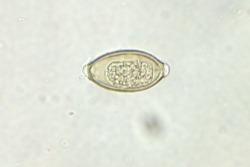Introduction To Diagnostic Parasitology

Trichuris trichiura egg
Parasitology is the study of parasites, their hosts, and the relationship between them. As a biological discipline, the scope of parasitology is not determined by the organism or environment in question, but by their way of life.
Diagnostic parasitology is the study of diseases of humans caused by parasitic agents. It is commonly limited to parasitic worms and the protozoa.
A parasite is an organism that lives by feeding upon another organism. Parasites living in the human body feed on our cells, our energy, our blood, the food we eat and even the supplements we take.
There are a wide variety of parasites that can infect humans. Each type of parasite has a specific life cycle and maturation process and may live in one or more hosts. Some parasites spend part of their life in an intermediate host, such as a sheep, cow, or snail, before infecting humans. Some infect humans “by accident.” Most parasites have an adult form and a cysty/egg/ova form. Some also mature through a larval phase, which is between the egg and the adult. Ova are hardy and can exist for some time in the environment without a host.
Diagnostic parasitology is the study of diseases of humans caused by parasitic agents. It is commonly limited to parasitic worms and the protozoa.
A parasite is an organism that lives by feeding upon another organism. Parasites living in the human body feed on our cells, our energy, our blood, the food we eat and even the supplements we take.
There are a wide variety of parasites that can infect humans. Each type of parasite has a specific life cycle and maturation process and may live in one or more hosts. Some parasites spend part of their life in an intermediate host, such as a sheep, cow, or snail, before infecting humans. Some infect humans “by accident.” Most parasites have an adult form and a cysty/egg/ova form. Some also mature through a larval phase, which is between the egg and the adult. Ova are hardy and can exist for some time in the environment without a host.
The Problem With Parasites
Parasites rob their host of nutrients by feeding on blood cells, tissue cells, and the food the host eats. Tapeworms, for example, take nutrients directly from the digestive system, that is, they eat the food before we can absorb it. This can cause malnutrition even in a person who eats a balanced, healthy diet. Parasites can cause diarrhea, which leads to nutrient malabsorption; because with diarrhea, food transit time can be so fast that the intestine does not have time for proper nutrient absorption. Parasites also cause damage to the lining of the digestive tract. This damage, or increased permeability, can allow large molecules to enter the blood stream and lymphatic system, which can trigger an autoimmune response.
Not only do parasites cause damage to the host, so do the wastes that they secrete. These waste products poison the body, forcing the organs of elimination to work harder to eliminate the extra toxic load. Processing these wastes can also stress the immune system. As the detoxification organs become overwhelmed, nutritional reserves are depleted and the immune system is weakened. The result can be the development of disease.
Parasitic Mode of Transmission
- Contaminated or unfiltered water
- Contaminated soil
- Contaminated fruits and vegetables
- Raw or rare meat
- Pets
- Mosquitoes
- Contact with feces
- Contact with someone with parasites
Symptoms
Many parasites cause noticeable symptoms, such as rectal itching or diarrhea, but some cause no noticeable symptoms. Because some parasites can travel through the blood to any organ, parasites can cause problems that are often not recognized as parasite-related. A parasitic infection can often go undiagnosed or misdiagnosed.
Symptoms of parasitic infection include:
Symptoms of parasitic infection include:
- Diarrhea or constipation
- Post nasal drip
- Gas, Bloating, Cramps
- Prostatitis
- Irritability / nervousness
- Sugar cravings
- Irritable Bowel Syndrome
- Ravenous appetite (or loss of appetite)
- Persistent Skin problems
- Allergies
- Fatigue
- Rectal itching
- Insomnia/ Disturbed sleep
- Brain fog
- Anemia
- Teeth grinding
- Muscle cramps
- Pain in the umbilicus
- Joint pain
- Bed-wetting
Diagnosis
A stool analysis is the most common method used to detect parasites. However, stool tests results can show a false negative if the parasite lives in the small intestine or elsewhere in the body. If the parasites are in the liver, heart or lungs, a stool test would commonly result in a false negative. Biopsies are needed in such cases.


